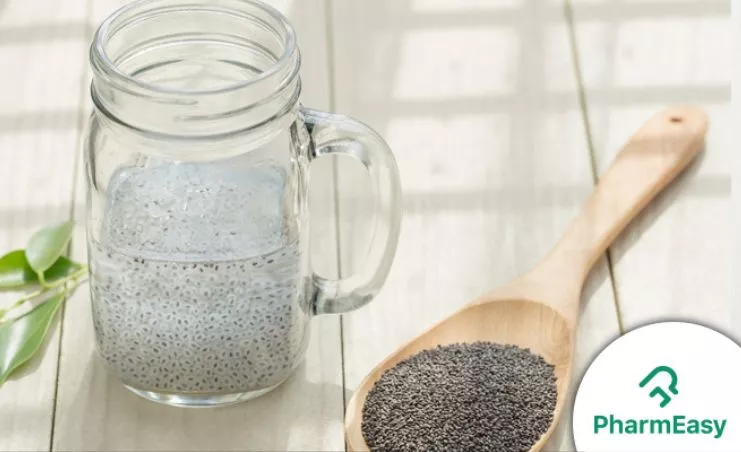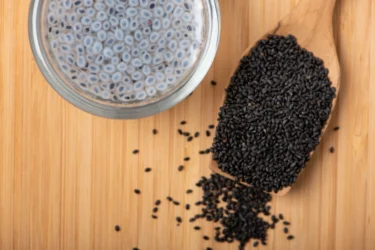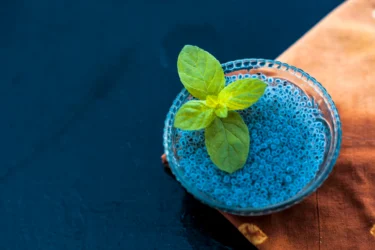Sabja Seeds: Health Benefits, Uses, Side Effects & More!
By Dr Prachi Garg +2 more

Get,

to manage your symptom
Get your,


4 Cr+ families
benefitted

OTP sent to 9988776655



You’ve successfully subscribed to receive
doctor-approved tips on
Whatsapp

Get ready to feel your best.

Hi There,
Download the PharmEasy App now!!


Register to Avail the Offer
Send OTPBy continuing, you agree with our Privacy Policy and Terms and Conditions

Hi There,
Sign up on PharmEasy now!!
Trusted by 4 crore+ families

OTP sent to 9988776655



You have unlocked 25% off on medicines




Code: NU25

Comments


Leave your comment here
By Dr Prachi Garg +2 more
Table of Contents
Sabja seeds, also called basil seeds, are widely known for their use in drinks and desserts, but these tiny black seeds have more to offer than you might expect! Sabja seeds are packed with health benefits compared to popular superfoods like flax seeds and chia seeds in their nutritional value. Extracted from sweet basil (distinct from holy basil, renowned for its immunity-boosting properties), sabja seeds are known as a wellness powerhouse.
Adding these mighty seeds to your diet can help transform your health. Here are the top health benefits of sabja seeds.

Friendly Reminder: The information shared here is for educational purposes only and the reader should consult a registered medical practitioner before implementing any changes to their health routine.

Drinks containing sabja seeds may provide relief from summer heat. Sabja seeds are known to reduce body heat and have a soothing effect on the stomach. These seeds can be part of various drinks like lemonades, coconut water, coconut milk, milkshakes, fruit-based smoothies, yoghurt etc.

People with diabetes should be particular about what they eat in order to keep their blood sugar levels steady. Sabja seeds have been found to contain anti-diabetes properties[2].

Sabja seeds are rich in soluble fibre. When these seeds are added to our diet with a good quantity of water, they absorb water and thus help draw water to our gut. This results in the softening of stools and promotes daily bowel movement. Thus, people suffering from constipation may get relief by making sabja a part of their daily diet[1].
Sabja seeds contain pectin, among many other soluble fibres. Pectin is proven to have prebiotic benefits. It helps balance gut bacteria by boosting the growth of good bacteria, which also helps in relieving acidity to a great extent.

Sabja seeds are high in soluble dietary fibre and help a person feel full. They also help regulate our bowel movement and thus help in cleansing our body from toxins.
The soluble, fermentable fibre pectin helps increase satiety and reduce caloric intake and adiposity while on a high-fat diet[3]. It also produces a fermentation environment more likely to promote hindgut health. Reduction in calorie intake thus helps people on weight loss journey.

Sabja seeds are a rich source of iron, calcium and magnesium. Calcium and magnesium are required for the optimal functioning of muscles and bones[6]. Iron is needed to maintain haemoglobin levels, which is the protein required to transport oxygen in the blood[1].

Sabja seeds contain an average of 2.5 grams of fat per 1 tablespoon. Of this fat, about half – 1,240 mg per tablespoon – is alpha-linolenic acid (ALA), an omega-3 fat.
The beneficial effects of omega-3 fatty acids include effects on lipids, blood pressure, cardiac and vascular function, eicosanoids, coagulation, and immunological responses[5]. These are known to decrease the risk of coronary heart disease, hypertension, stroke and their complications.

Sabja seeds are a good source of plant chemicals like flavonoids and polyphenols [4]. Flavonoids are the largest group of phytonutrients, known for their anti-oxidative, anti-inflammatory, anti-mutagenic and anti-carcinogenic properties along with their capacity to modulate key cellular enzyme function.

Sabja seeds have proven anti-bacterial, anti-viral and anti-fungal properties[4]. They are helpful in healing mouth ulcers. They can also be used as a mouth freshener.

Pectin, a type of soluble fibre present in sabja seeds, may help lower the cholesterol levels in our body. It may reduce the absorption of cholesterol in our gut[1].

Sabja seeds have a calming effect on the body as well as the mind. They can be helpful for people dealing with stress, tension, and anxiety in addition to prescribed treatment and therapy.
Sabja seeds are rich in flavonoids, tannins and terpenoids. Their anti-oxidant activity is also shown to have memory-enhancing effects in some[1].
Soak around 2 teaspoons of sabja seeds in a cup of warm water for around 15 minutes. They swell and a translucent grey film coating develops around each black seed as they increase in size.
You can now make these seeds a part of a variety of drinks like lemonade, milkshakes, coconut water, smoothies, buttermilk, soups and so on. You can also add them to ice creams, pasta and salads for a nice crunchy taste.
Ideally, you should not consume more than 2 teaspoons of sabja seeds a day.
Also Read: Fennel (Saunf) Seeds: Uses, Benefits, Side Effects, and more!
Also Read: Chia Seeds for Weight Loss: Benefits, How to Use Them & Best Ways to Eat Them
Also Read: 15 Amazing Health Benefits of Papaya Seeds That You Should Know!
Sabja seeds are a natural and vegetarian source of protein. You can consume these seeds daily to strengthen bones, muscles, and skin and to stimulate the production of enzymes, hormones and other body chemicals for better functioning of the body. However, if you have any medical condition, it is best to consult the doctor.
There’s no direct evidence linking sabja seeds to acne. However, excessive consumption might contribute to acne for some individuals due to potential hormonal effects or allergies. It’s best to consume them in moderation and observe reactions, if any.
Sabja seeds are believed to have a cooling effect on the body according to Ayurvedic practices. They are often used in drinks like falooda during hot weather to help cool down the body. However, scientific evidence supporting this specific claim is limited, and individual responses may vary.
Sabja seeds can aid in weight loss as they are high in fiber, which promotes feelings of fullness and helps control appetite. Additionally, their low-calorie content makes them a good addition to a weight loss diet. However, they should be consumed in moderation.
There’s no scientific evidence to suggest that sabja seeds can delay periods. However, some anecdotal claims and traditional practices exist. If you have concerns about menstrual irregularities, it’s best to consult with a healthcare professional.
Sabja seeds are generally considered beneficial for managing uric acid levels due to their anti-inflammatory properties. However, individual responses may vary, so it’s advisable to consult with a healthcare provider.
Disclaimer: The information provided here is for educational/awareness purposes only and is not intended to be a substitute for medical treatment by a healthcare professional and should not be relied upon to diagnose or treat any medical condition. The reader should consult a registered medical practitioner to determine the appropriateness of the information and before consuming any medication. PharmEasy does not provide any guarantee or warranty (express or implied) regarding the accuracy, adequacy, completeness, legality, reliability or usefulness of the information; and disclaims any liability arising thereof.
Comments

Leave your comment...

View all comments(3)
You may also like
Iam undergo recently surgery for gallbladder stone and iam also suffering from IBD since last 8 months . due heavy dose of medicine my weight has increased so in this situation can i take sabja seeds for weight reduce.
Hi ua post was very useful….
I have a question, if sabja seeds taken in excess
And stomach pains
What can be done now to reduce the effect of excess intake of sabja seeds????
Thank you for your sharing the health benefits of Sabja Seeds. I am starting to eat 1/4 tsp in the morning and 1/4 tsp in the evening.